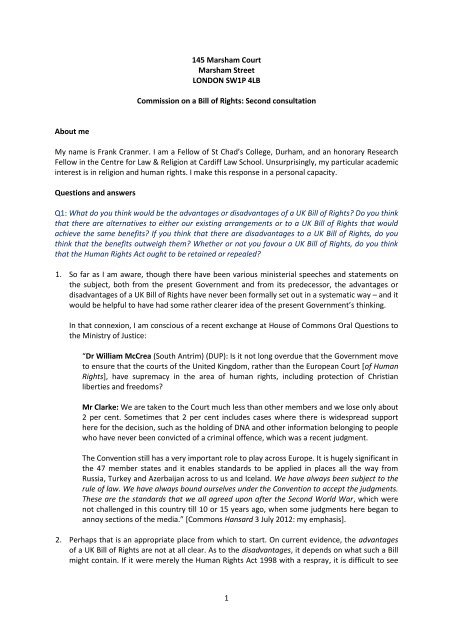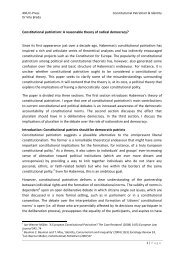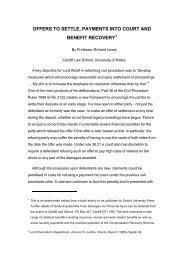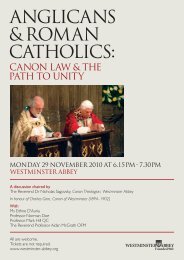Response to Commission on a Bill of Rights, Second Consultation
Response to Commission on a Bill of Rights, Second Consultation
Response to Commission on a Bill of Rights, Second Consultation
Create successful ePaper yourself
Turn your PDF publications into a flip-book with our unique Google optimized e-Paper software.
145 Marsham CourtMarsham StreetLONDON SW1P 4LB<str<strong>on</strong>g>Commissi<strong>on</strong></str<strong>on</strong>g> <strong>on</strong> a <strong>Bill</strong> <strong>of</strong> <strong>Rights</strong>: Sec<strong>on</strong>d c<strong>on</strong>sultati<strong>on</strong>About meMy name is Frank Cranmer. I am a Fellow <strong>of</strong> St Chad’s College, Durham, and an h<strong>on</strong>orary ResearchFellow in the Centre for Law & Religi<strong>on</strong> at Cardiff Law School. Unsurprisingly, my particular academicinterest is in religi<strong>on</strong> and human rights. I make this resp<strong>on</strong>se in a pers<strong>on</strong>al capacity.Questi<strong>on</strong>s and answersQ1: What do you think would be the advantages or disadvantages <strong>of</strong> a UK <strong>Bill</strong> <strong>of</strong> <strong>Rights</strong>? Do you thinkthat there are alternatives <str<strong>on</strong>g>to</str<strong>on</strong>g> either our existing arrangements or <str<strong>on</strong>g>to</str<strong>on</strong>g> a UK <strong>Bill</strong> <strong>of</strong> <strong>Rights</strong> that wouldachieve the same benefits? If you think that there are disadvantages <str<strong>on</strong>g>to</str<strong>on</strong>g> a UK <strong>Bill</strong> <strong>of</strong> <strong>Rights</strong>, do youthink that the benefits outweigh them? Whether or not you favour a UK <strong>Bill</strong> <strong>of</strong> <strong>Rights</strong>, do you thinkthat the Human <strong>Rights</strong> Act ought <str<strong>on</strong>g>to</str<strong>on</strong>g> be retained or repealed?1. So far as I am aware, though there have been various ministerial speeches and statements <strong>on</strong>the subject, both from the present Government and from its predecessor, the advantages ordisadvantages <strong>of</strong> a UK <strong>Bill</strong> <strong>of</strong> <strong>Rights</strong> have never been formally set out in a systematic way – and itwould be helpful <str<strong>on</strong>g>to</str<strong>on</strong>g> have had some rather clearer idea <strong>of</strong> the present Government’s thinking.In that c<strong>on</strong>nexi<strong>on</strong>, I am c<strong>on</strong>scious <strong>of</strong> a recent exchange at House <strong>of</strong> Comm<strong>on</strong>s Oral Questi<strong>on</strong>s <str<strong>on</strong>g>to</str<strong>on</strong>g>the Ministry <strong>of</strong> Justice:“Dr William McCrea (South Antrim) (DUP): Is it not l<strong>on</strong>g overdue that the Government move<str<strong>on</strong>g>to</str<strong>on</strong>g> ensure that the courts <strong>of</strong> the United Kingdom, rather than the European Court [<strong>of</strong> Human<strong>Rights</strong>], have supremacy in the area <strong>of</strong> human rights, including protecti<strong>on</strong> <strong>of</strong> Christianliberties and freedoms?Mr Clarke: We are taken <str<strong>on</strong>g>to</str<strong>on</strong>g> the Court much less than other members and we lose <strong>on</strong>ly about2 per cent. Sometimes that 2 per cent includes cases where there is widespread supporthere for the decisi<strong>on</strong>, such as the holding <strong>of</strong> DNA and other informati<strong>on</strong> bel<strong>on</strong>ging <str<strong>on</strong>g>to</str<strong>on</strong>g> peoplewho have never been c<strong>on</strong>victed <strong>of</strong> a criminal <strong>of</strong>fence, which was a recent judgment.The C<strong>on</strong>venti<strong>on</strong> still has a very important role <str<strong>on</strong>g>to</str<strong>on</strong>g> play across Europe. It is hugely significant inthe 47 member states and it enables standards <str<strong>on</strong>g>to</str<strong>on</strong>g> be applied in places all the way fromRussia, Turkey and Azerbaijan across <str<strong>on</strong>g>to</str<strong>on</strong>g> us and Iceland. We have always been subject <str<strong>on</strong>g>to</str<strong>on</strong>g> therule <strong>of</strong> law. We have always bound ourselves under the C<strong>on</strong>venti<strong>on</strong> <str<strong>on</strong>g>to</str<strong>on</strong>g> accept the judgments.These are the standards that we all agreed up<strong>on</strong> after the Sec<strong>on</strong>d World War, which werenot challenged in this country till 10 or 15 years ago, when some judgments here began <str<strong>on</strong>g>to</str<strong>on</strong>g>annoy secti<strong>on</strong>s <strong>of</strong> the media.” [Comm<strong>on</strong>s Hansard 3 July 2012: my emphasis].2. Perhaps that is an appropriate place from which <str<strong>on</strong>g>to</str<strong>on</strong>g> start. On current evidence, the advantages<strong>of</strong> a UK <strong>Bill</strong> <strong>of</strong> <strong>Rights</strong> are not at all clear. As <str<strong>on</strong>g>to</str<strong>on</strong>g> the disadvantages, it depends <strong>on</strong> what such a <strong>Bill</strong>might c<strong>on</strong>tain. If it were merely the Human <strong>Rights</strong> Act 1998 with a respray, it is difficult <str<strong>on</strong>g>to</str<strong>on</strong>g> see1
what purpose re-enactment would serve. If it were the “ECHR plus”, then it is difficult <str<strong>on</strong>g>to</str<strong>on</strong>g> seewhat the “plus” might be.3. But what if it turned out <str<strong>on</strong>g>to</str<strong>on</strong>g> be “ECHR minus”? Unless it made the necessary derogati<strong>on</strong>s fromthe C<strong>on</strong>venti<strong>on</strong>, as a signa<str<strong>on</strong>g>to</str<strong>on</strong>g>ry the UK would presumably remain be bound by the ECHR as amatter <strong>of</strong> internati<strong>on</strong>al law, whatever the domestic legislati<strong>on</strong> said. In the event that a UK <strong>Bill</strong> <strong>of</strong><strong>Rights</strong> purported <str<strong>on</strong>g>to</str<strong>on</strong>g> reduce C<strong>on</strong>venti<strong>on</strong> rights those rights would, presumably, still be recognisedin Strasbourg – but they would not be justiciable before the domestic courts. That, in my view,would be the worst <strong>of</strong> the three outcomes and, as I suggest below, might put us in c<strong>on</strong>flict withEuropean Uni<strong>on</strong> law.4. In short, I am not c<strong>on</strong>vinced that there are compelling reas<strong>on</strong>s <str<strong>on</strong>g>to</str<strong>on</strong>g> replace HRA 1998 with newlegislati<strong>on</strong> at all. As the Lord Chancellor pointed out, we have always been subject <str<strong>on</strong>g>to</str<strong>on</strong>g> the rule <strong>of</strong>law, we have always bound ourselves <str<strong>on</strong>g>to</str<strong>on</strong>g> accept judgments under the ECHR if taken there and wehave been doing so since the <str<strong>on</strong>g>Commissi<strong>on</strong></str<strong>on</strong>g> (as was) and the Court were established. Even before1998 the domestic courts regarded Strasbourg jurisprudence as persuasive authority. So whathas changed?Q2: In c<strong>on</strong>sidering the arguments for and against a UK <strong>Bill</strong> <strong>of</strong> <strong>Rights</strong>, <str<strong>on</strong>g>to</str<strong>on</strong>g> what extent do you believethat the European C<strong>on</strong>venti<strong>on</strong> <strong>on</strong> Human <strong>Rights</strong> should or should not remain incorporated in<str<strong>on</strong>g>to</str<strong>on</strong>g> ourdomestic law?5. The ECHR should certainly c<strong>on</strong>tinue <str<strong>on</strong>g>to</str<strong>on</strong>g> be incorporated in domestic law: the alternative would(presumably) be that, at least in principle, the domestic courts would no l<strong>on</strong>ger be obliged takeaccount <strong>of</strong> the rulings <strong>of</strong> the ECtHR. If that were <str<strong>on</strong>g>to</str<strong>on</strong>g> happen, C<strong>on</strong>venti<strong>on</strong> rights could <strong>on</strong>ly beasserted in Strasbourg – in which case the <strong>on</strong>ly claimants who would be able <str<strong>on</strong>g>to</str<strong>on</strong>g> assert thoserights would be instituti<strong>on</strong>al litigants, the very rich or those who were legally-aided.6. A further issue is the backlog <strong>of</strong> cases at the ECtHR and the length <strong>of</strong> time that it would take forhuman rights points <str<strong>on</strong>g>to</str<strong>on</strong>g> be resolved should the C<strong>on</strong>venti<strong>on</strong> cease <str<strong>on</strong>g>to</str<strong>on</strong>g> be justiciable in thedomestic courts. One might reas<strong>on</strong>ably ask whether a system that <strong>on</strong>ly allows human rightspoints <str<strong>on</strong>g>to</str<strong>on</strong>g> be adjudicated right at the very end <strong>of</strong> the process and after (possibly) several yearslitigati<strong>on</strong> provides “a fair and public hearing within a reas<strong>on</strong>able time” in terms <strong>of</strong> Article 6.7. The suspici<strong>on</strong>, however, is that whether or not the ECHR remains incorporated in domestic law,the UK courts will still tend <str<strong>on</strong>g>to</str<strong>on</strong>g> take account <strong>of</strong> it and <strong>of</strong> Strasbourg jurisprudence as persuasiveauthorities – as they did <str<strong>on</strong>g>to</str<strong>on</strong>g> a greater or lesser extent prior <str<strong>on</strong>g>to</str<strong>on</strong>g> 1998 – for three reas<strong>on</strong>s:partly <str<strong>on</strong>g>to</str<strong>on</strong>g> avoid the embarrassment <strong>of</strong> being, in effect, reversed by the ECtHR <strong>on</strong> a humanrights point;partly because Article 6(2) and (3) <strong>of</strong> the Treaty <strong>of</strong> Lisb<strong>on</strong> provides that the Uni<strong>on</strong> “shallaccede” <str<strong>on</strong>g>to</str<strong>on</strong>g> the ECHR and that “[f]undamental rights, as guaranteed by the EuropeanC<strong>on</strong>venti<strong>on</strong> for the Protecti<strong>on</strong> <strong>of</strong> Human <strong>Rights</strong> and Fundamental Freedoms and as theyresult from the c<strong>on</strong>stituti<strong>on</strong>al traditi<strong>on</strong>s comm<strong>on</strong> <str<strong>on</strong>g>to</str<strong>on</strong>g> the Member States, shall c<strong>on</strong>stitutegeneral principles <strong>of</strong> the Uni<strong>on</strong>'s law”; andpartly because the Preamble <str<strong>on</strong>g>to</str<strong>on</strong>g> the Charter <strong>of</strong> Fundamental <strong>Rights</strong> <strong>of</strong> the European Uni<strong>on</strong>(CFREU), in effect, incorporates the ECHR in<str<strong>on</strong>g>to</str<strong>on</strong>g> EU law by declaring that the Uni<strong>on</strong>2
“reaffirms, with due regard for the powers and tasks <strong>of</strong> the Community and the Uni<strong>on</strong> andthe principle <strong>of</strong> subsidiarity, the rights as they result, in particular, from the c<strong>on</strong>stituti<strong>on</strong>altraditi<strong>on</strong>s and internati<strong>on</strong>al obligati<strong>on</strong>s comm<strong>on</strong> <str<strong>on</strong>g>to</str<strong>on</strong>g> the Member States, the Treaty <strong>on</strong>European Uni<strong>on</strong>, the Community Treaties, the European C<strong>on</strong>venti<strong>on</strong> for the Protecti<strong>on</strong> <strong>of</strong>Human <strong>Rights</strong> and Fundamental Freedoms, the Social Charters adopted by the Communityand by the Council <strong>of</strong> Europe and the case-law <strong>of</strong> the Court <strong>of</strong> Justice <strong>of</strong> the EuropeanCommunities and <strong>of</strong> the European Court <strong>of</strong> Human <strong>Rights</strong>”.8. Under s 2(1) European Communities Act 1972:“All … rights, powers, liabilities, obligati<strong>on</strong>s and restricti<strong>on</strong>s from time <str<strong>on</strong>g>to</str<strong>on</strong>g> time created orarising by or under the Treaties, and all such remedies and procedures from time <str<strong>on</strong>g>to</str<strong>on</strong>g> timeprovided for by or under the Treaties, as in accordance with the Treaties are without furtherenactment <str<strong>on</strong>g>to</str<strong>on</strong>g> be given legal effect or used in the United Kingdom shall be recognised andavailable in law, and be enforced, allowed and followed accordingly”.9. If EU law takes precedence over domestic law, do Article 6(2) and (3) <strong>of</strong> the Treaty <strong>of</strong> Lisb<strong>on</strong> andthe Preamble <str<strong>on</strong>g>to</str<strong>on</strong>g> the CFREU c<strong>on</strong>stitute “rights, powers, liabilities, obligati<strong>on</strong>s and restricti<strong>on</strong>sfrom time <str<strong>on</strong>g>to</str<strong>on</strong>g> time created or arising by or under the Treaties” – and if they do, are they not atleast in some sense manda<str<strong>on</strong>g>to</str<strong>on</strong>g>ry?10. Surely a key questi<strong>on</strong> is this: <str<strong>on</strong>g>to</str<strong>on</strong>g> what extent are the arguments espoused by the thenGovernment when HRA 1998 was enacted still valid?Q3: If there were <str<strong>on</strong>g>to</str<strong>on</strong>g> be a UK <strong>Bill</strong> <strong>of</strong> <strong>Rights</strong>, should it replace or sit al<strong>on</strong>gside the Human <strong>Rights</strong> Act1998?11. It depends what is meant by “replace”. If there is <str<strong>on</strong>g>to</str<strong>on</strong>g> be a UK <strong>Bill</strong> <strong>of</strong> <strong>Rights</strong> it would be preferablefor its provisi<strong>on</strong>s <str<strong>on</strong>g>to</str<strong>on</strong>g> be additi<strong>on</strong>al <str<strong>on</strong>g>to</str<strong>on</strong>g> the HRA 1998 rather than a replacement for it; in technicallegislative terms, however, it would be preferable for the c<strong>on</strong>tent <strong>of</strong> the HRA <str<strong>on</strong>g>to</str<strong>on</strong>g> be repealed andre-enacted with the new material as part <strong>of</strong> a single, comprehensive statute (which would theninclude the UK <strong>Bill</strong> <strong>of</strong> <strong>Rights</strong> provisi<strong>on</strong>s al<strong>on</strong>gside the HRA provisi<strong>on</strong>s) so that potential claimantsand their advisers had <str<strong>on</strong>g>to</str<strong>on</strong>g> c<strong>on</strong>sult <strong>on</strong>ly <strong>on</strong>e Act rather than two. A single statute would also avoidthe (possibly inevitable) debate in the courts about the precise relati<strong>on</strong>ship between the new<strong>Bill</strong> <strong>of</strong> <strong>Rights</strong> and HRA.12. And what if – however careful the drafting – the proposed <strong>Bill</strong> <strong>of</strong> <strong>Rights</strong> and the HRA wereimplicitly inc<strong>on</strong>sistent? Would the c<strong>on</strong>clusi<strong>on</strong> <strong>of</strong> Laws LJ in Thoburn v Sunderland City Council[2002] EWHC 195 (Admin) about the “implied repeal” doctrine be relevant? In paragraph 69 hestated that the European Communities Act 1972 was a c<strong>on</strong>stituti<strong>on</strong>al statute that could not beimpliedly repealed and went <strong>on</strong> <str<strong>on</strong>g>to</str<strong>on</strong>g> declare (at para 69) that that fact “[was] derived, not from EUlaw, but purely from the law <strong>of</strong> England: the comm<strong>on</strong> law recognises a category <strong>of</strong> c<strong>on</strong>stituti<strong>on</strong>alstatutes”.13. Is the HRA 1998 a “c<strong>on</strong>stituti<strong>on</strong>al statute” in the terms unders<str<strong>on</strong>g>to</str<strong>on</strong>g>od by Laws LJ? And would theproposed <strong>Bill</strong> <strong>of</strong> <strong>Rights</strong> be such a “c<strong>on</strong>stituti<strong>on</strong>al statute”?3
Q4: Should the rights and freedoms in any UK <strong>Bill</strong> <strong>of</strong> <strong>Rights</strong> be expressed in the same or differentlanguage from that currently used in the Human <strong>Rights</strong> Act and the European C<strong>on</strong>venti<strong>on</strong> <strong>on</strong> Human<strong>Rights</strong>? If different, in what ways should the rights and freedoms be differently expressed?Q5: What advantages or disadvantages do you think there would be, if any, if the rights andfreedoms in any UK <strong>Bill</strong> <strong>of</strong> <strong>Rights</strong> were expressed in different language from that used in theEuropean C<strong>on</strong>venti<strong>on</strong> <strong>on</strong> Human <strong>Rights</strong> and the Human <strong>Rights</strong> Act 1998?14. I can see no good reas<strong>on</strong> for expressing “human rights” in terms different from those in theECHR (and the HRA). Even if the UK changes the language it will still – if my reading <strong>of</strong> EU law iscorrect – be bound by the terms <strong>of</strong> the ECHR. And would the “rights and freedoms in any UK <strong>Bill</strong><strong>of</strong> <strong>Rights</strong>” be inalienable human rights inhering in the claimant’s humanity or civic rights inheringin the claimant’s citizenship? The distincti<strong>on</strong> is an important <strong>on</strong>e which is <strong>of</strong>ten lost sight <strong>of</strong> <strong>on</strong>both sides <strong>of</strong> the human rights argument.15. And what about the effect <strong>of</strong> the CFREU? So far as I am aware it is not at the moment directlyjusticiable in the domestic courts; however, given that it virtually replicates within itself thec<strong>on</strong>tent <strong>of</strong> the ECHR – though its terms, overall, are wider – under the current arrangements it ispresumably simpler <str<strong>on</strong>g>to</str<strong>on</strong>g> cite the ECHR than the CFREU. But if the provisi<strong>on</strong>s <strong>of</strong> the ECHR ceased <str<strong>on</strong>g>to</str<strong>on</strong>g>be directly justiciable, might not claimants begin <str<strong>on</strong>g>to</str<strong>on</strong>g> cite the CFREU instead, arguing for the directapplicability <strong>of</strong> its provisi<strong>on</strong>s under s 2(1) European Communities Act 1972, as “rights, powers,liabilities, obligati<strong>on</strong>s and restricti<strong>on</strong>s from time <str<strong>on</strong>g>to</str<strong>on</strong>g> time created or arising by or under theTreaties”? And, if they were <str<strong>on</strong>g>to</str<strong>on</strong>g> do so, might that bring in<str<strong>on</strong>g>to</str<strong>on</strong>g> play the wider provisi<strong>on</strong>s <strong>of</strong> theCFREU that are not included in the ECHR?Q6: Do you think any UK <strong>Bill</strong> <strong>of</strong> <strong>Rights</strong> should include additi<strong>on</strong>al rights and, if so, which? Do you haveviews <strong>on</strong> the possible wording <strong>of</strong> such additi<strong>on</strong>al rights as you believe should be included in any UK<strong>Bill</strong> <strong>of</strong> <strong>Rights</strong>? Some <strong>of</strong> the rights suggested are:a right <str<strong>on</strong>g>to</str<strong>on</strong>g> equality;a right <str<strong>on</strong>g>to</str<strong>on</strong>g> administrative justice;a right <str<strong>on</strong>g>to</str<strong>on</strong>g> trial by jury;rights in criminal and civil justice;rights for victims;socio-ec<strong>on</strong>omic rights;children’s rights; andenvir<strong>on</strong>mental rights.16. For a general answer, see below. On the specific drafting point, I would suggest that anyenumerati<strong>on</strong> <strong>of</strong> new rights ought <str<strong>on</strong>g>to</str<strong>on</strong>g> follow the lines <strong>of</strong> basic model <strong>of</strong> the ECHR, ie:“Right <str<strong>on</strong>g>to</str<strong>on</strong>g> [cricket]1. Every<strong>on</strong>e has the right <str<strong>on</strong>g>to</str<strong>on</strong>g> [play and watch cricket], either al<strong>on</strong>e or in community withothers and in public or in private, [in any form that has been duly authorised by theInternati<strong>on</strong>al Cricket Council].2. The freedom <str<strong>on</strong>g>to</str<strong>on</strong>g> [play and watch cricket] shall be subject <strong>on</strong>ly <str<strong>on</strong>g>to</str<strong>on</strong>g> such limitati<strong>on</strong>s as areprescribed by law and are necessary in a democratic society in the interests <strong>of</strong> public safety,for the protecti<strong>on</strong> <strong>of</strong> public order, health or morals, or for the protecti<strong>on</strong> <strong>of</strong> the rights andfreedoms <strong>of</strong> others.”4
Q7: What in your view would be the advantages, disadvantages or challenges <strong>of</strong> the inclusi<strong>on</strong> <strong>of</strong> suchadditi<strong>on</strong>al rights?17. Many <strong>of</strong> the suggested rights in Q6 are the subject <strong>of</strong> treaty obligati<strong>on</strong>s <str<strong>on</strong>g>to</str<strong>on</strong>g> which the UK isalready a signa<str<strong>on</strong>g>to</str<strong>on</strong>g>ry. As Aoife Nolan has pointed out:“Like the majority <strong>of</strong> European and other countries, the UK has volunteered <str<strong>on</strong>g>to</str<strong>on</strong>g> be bound bya range <strong>of</strong> such rights as a result <strong>of</strong> ratifying a number <strong>of</strong> internati<strong>on</strong>al human rights treaties,including the Internati<strong>on</strong>al Covenant <strong>on</strong> Ec<strong>on</strong>omic, Social and Cultural <strong>Rights</strong> (ratified by theUK in 1976); the C<strong>on</strong>venti<strong>on</strong> <strong>on</strong> the <strong>Rights</strong> <strong>of</strong> the Child (ratified in 1992) and the EuropeanSocial Charter (ratified by the UK in 1962). While these treaties haven’t been made part <strong>of</strong>our domestic law in the way the European C<strong>on</strong>venti<strong>on</strong> <strong>on</strong> Human <strong>Rights</strong> has been as a resul<str<strong>on</strong>g>to</str<strong>on</strong>g>f the Human <strong>Rights</strong> Act, they impose a range <strong>of</strong> human rights obligati<strong>on</strong>s <strong>on</strong> the UK. Thegovernment reports back periodically <str<strong>on</strong>g>to</str<strong>on</strong>g> the UN expert committees that m<strong>on</strong>i<str<strong>on</strong>g>to</str<strong>on</strong>g>r theimplementati<strong>on</strong> <strong>of</strong> these treaties” [see http://ukhumanrightsblog.com/2012/07/17/d<strong>on</strong>tbelieve-everything-you-read-there-is-a-case-for-socio-ec<strong>on</strong>omic-rights-pr<strong>of</strong>essor-aoifenolan/].18. The advantage <strong>of</strong> including additi<strong>on</strong>al rights would be that their inclusi<strong>on</strong> would clarify theirstatus in domestic law.19. The disadvantage would be that – however desirable they might be as aspirati<strong>on</strong>s – some <strong>of</strong> therights under those treaties are virtually unachievable in practice. For example, the Preamble <str<strong>on</strong>g>to</str<strong>on</strong>g>the UN C<strong>on</strong>venti<strong>on</strong> <strong>on</strong> the <strong>Rights</strong> <strong>of</strong> the Child states that “the child, for the full and harm<strong>on</strong>iousdevelopment <strong>of</strong> his or her pers<strong>on</strong>ality, should grow up in a family envir<strong>on</strong>ment, in anatmosphere <strong>of</strong> happiness, love and understanding”. No-<strong>on</strong>e would dispute that: but how is thestate <str<strong>on</strong>g>to</str<strong>on</strong>g> guarantee that implied right and by what mechanism might a child who, for example, iscurrently looked after by a local authority assert that implied right in practice – even if it werewritten in<str<strong>on</strong>g>to</str<strong>on</strong>g> domestic law?20. The challenge is <strong>on</strong>e <strong>of</strong> Realpolitik: could the present Government realistically hope <str<strong>on</strong>g>to</str<strong>on</strong>g> legislate<str<strong>on</strong>g>to</str<strong>on</strong>g> extend the current range <strong>of</strong> rights justiciable under domestic law without antag<strong>on</strong>ising a largenumber <strong>of</strong> its own backbenchers?21. As <str<strong>on</strong>g>to</str<strong>on</strong>g> detail, in the case <strong>of</strong> (eg) a “right <str<strong>on</strong>g>to</str<strong>on</strong>g> trial by jury”, surely the right under Article 9 ECHR andArticle 47 CFREU is <str<strong>on</strong>g>to</str<strong>on</strong>g> “a fair and public hearing within a reas<strong>on</strong>able time by an independent andimpartial tribunal [previously] established by law”? Were the Diplock courts in Northern Irelandnot “fair and public”? Realistically, would any Government wish <str<strong>on</strong>g>to</str<strong>on</strong>g> extend the right <str<strong>on</strong>g>to</str<strong>on</strong>g> jury trialbey<strong>on</strong>d its present limits – against the directi<strong>on</strong> <strong>of</strong> travel – by, for example, extending the verynarrow range <strong>of</strong> civil jury trials?22. Similarly, what would “rights in criminal and civil justice” actually mean, over and above theright <str<strong>on</strong>g>to</str<strong>on</strong>g> a fair trial? Every baby law-student learns that ignorantia iuris haud excusat – but whatdoes that mean in practice for a lay pers<strong>on</strong> c<strong>on</strong>fr<strong>on</strong>ted with the complexities <strong>of</strong> the Value AddedTax Act 1994 or the Companies Act 2006? What about, for example, ready access <str<strong>on</strong>g>to</str<strong>on</strong>g> legal texts:might the Ministry <strong>of</strong> Justice seek <str<strong>on</strong>g>to</str<strong>on</strong>g> support such access by giving (much needed) financialsupport <str<strong>on</strong>g>to</str<strong>on</strong>g> BAILII? Moreover, <str<strong>on</strong>g>to</str<strong>on</strong>g> what extent would “rights in criminal and civil justice” extend <str<strong>on</strong>g>to</str<strong>on</strong>g>a right <str<strong>on</strong>g>to</str<strong>on</strong>g> be legally-represented? And if it did extend <str<strong>on</strong>g>to</str<strong>on</strong>g> civil justice, what about civil legal aid?5
Q8: Should any UK <strong>Bill</strong> <strong>of</strong> <strong>Rights</strong> seek <str<strong>on</strong>g>to</str<strong>on</strong>g> give guidance <str<strong>on</strong>g>to</str<strong>on</strong>g> our courts <strong>on</strong> the balance <str<strong>on</strong>g>to</str<strong>on</strong>g> be struckbetween qualified and competing C<strong>on</strong>venti<strong>on</strong> rights? If so, in what way?23. I am exceedingly doubtful about any such proposal, for three reas<strong>on</strong>s.First, where the claimant is seeking <str<strong>on</strong>g>to</str<strong>on</strong>g> enforce a right against the State, it would beunfortunate if s/he were <str<strong>on</strong>g>to</str<strong>on</strong>g> find the claim in some way hindered by guidance emanatingfrom the State, even if it had been endorsed by Parliament in the process.Sec<strong>on</strong>dly, would putting such guidance in<str<strong>on</strong>g>to</str<strong>on</strong>g> statute end the matter anyway? Surely it wouldrun the risk <strong>of</strong> providing yet another piece <strong>of</strong> human rights law which would then be thesubject <strong>of</strong> further argument in the domestic courts – and, presumably, would be ultimatelyreviewable by Strasbourg.Thirdly, if the underlying implicati<strong>on</strong> <strong>of</strong> this questi<strong>on</strong> is “should there be a hierarchy <strong>of</strong>rights?” an affirmative answer would depend <strong>on</strong> whether or not there could ever be anygeneral agreement <strong>on</strong> an order <strong>of</strong> precedence for such a hierarchy. For my part, I believethat Article 14 ECHR (prohibiti<strong>on</strong> <strong>of</strong> discriminati<strong>on</strong>) is far more important than Article 1 <strong>of</strong>the Fourth Pro<str<strong>on</strong>g>to</str<strong>on</strong>g>col (prohibiti<strong>on</strong> <strong>of</strong> impris<strong>on</strong>ment for debt). But the recent arguments in, forexample, Ladele v L<strong>on</strong>d<strong>on</strong> Borough <strong>of</strong> Isling<str<strong>on</strong>g>to</str<strong>on</strong>g>n [2009] EWCA Civ 1357 and McFarlane vRelate Av<strong>on</strong> Ltd [2010] EWCA Civ B1 – and, more especially, the public comments <strong>on</strong> the twocases – suggest that there are c<strong>on</strong>flicting views as <str<strong>on</strong>g>to</str<strong>on</strong>g> whether or not Article 9 (freedom <strong>of</strong>thought, c<strong>on</strong>science and religi<strong>on</strong>) should take precedence over Article 8 (right <str<strong>on</strong>g>to</str<strong>on</strong>g> respect forprivate and family life) and Article 14. In short, there is a perennial problem <strong>of</strong> “clashingrights” which I suspect is irresoluble.Q9: Presuming any UK <strong>Bill</strong> <strong>of</strong> <strong>Rights</strong> c<strong>on</strong>tained a duty <strong>on</strong> public authorities similar <str<strong>on</strong>g>to</str<strong>on</strong>g> that in secti<strong>on</strong> 6<strong>of</strong> the Human <strong>Rights</strong> Act 1998, is there a need <str<strong>on</strong>g>to</str<strong>on</strong>g> amend the definiti<strong>on</strong> <strong>of</strong> ‘public authority’? If so,how?24. Not so far as I am aware.Q10: Should there be a role for resp<strong>on</strong>sibilities in any UK <strong>Bill</strong> <strong>of</strong> <strong>Rights</strong>? If so, in which <strong>of</strong> the ways se<str<strong>on</strong>g>to</str<strong>on</strong>g>ut above might it be included?25. I have noted elsewhere 1 that the Roman Catholic Codex Iuris Can<strong>on</strong>ici 1983 always speaks <strong>of</strong>“duties and rights” rather than “rights and duties” and that the Roman Catholic model does notproceed exclusively from the comm<strong>on</strong> law assumpti<strong>on</strong> that “if A has a right, B has acorresp<strong>on</strong>ding duty” since, in additi<strong>on</strong>, the Codex assumes that a right may imply a dutysubsisting in the same pers<strong>on</strong>. In the social theology <strong>of</strong> Pacem in Terris (1963) at para 44, forexample:“[M]an’s awareness <strong>of</strong> his rights must inevitably lead him <str<strong>on</strong>g>to</str<strong>on</strong>g> the recogniti<strong>on</strong> <strong>of</strong> his duties.The possessi<strong>on</strong> <strong>of</strong> rights involves the duty <strong>of</strong> implementing those rights, for they are theexpressi<strong>on</strong> <strong>of</strong> a man’s pers<strong>on</strong>al dignity”.1 F Cranmer: ‘Human <strong>Rights</strong> and the Christian Traditi<strong>on</strong>: A Quaker Perspective’ in N Doe and R Sandberg (eds)New Directi<strong>on</strong>s in Law and Religi<strong>on</strong> (Peeters: Leuven 2010) 133–158. And I should say for the avoidance <strong>of</strong>doubt that I am a Quaker, not a Roman Catholic – but there is a lot in Roman Catholic social teaching thatQuakers would sign up <str<strong>on</strong>g>to</str<strong>on</strong>g>.6
26. When he was Lord Chancellor Jack Straw warned against the “commoditisati<strong>on</strong>” <strong>of</strong> rights: thatrights tended <str<strong>on</strong>g>to</str<strong>on</strong>g> become“… yet more items <str<strong>on</strong>g>to</str<strong>on</strong>g> be ‘claimed’. This is dem<strong>on</strong>strated in how some people seek <str<strong>on</strong>g>to</str<strong>on</strong>g>exercise their rights in a selfish way without regard <str<strong>on</strong>g>to</str<strong>on</strong>g> others – which injures thephilosophical basis <strong>of</strong> inalienable, fundamental human rights”. 2Further:“In a democracy, rights tend <str<strong>on</strong>g>to</str<strong>on</strong>g> be ‘vertical’: guaranteed <str<strong>on</strong>g>to</str<strong>on</strong>g> the individual by the state <str<strong>on</strong>g>to</str<strong>on</strong>g>c<strong>on</strong>strain the otherwise overweening power <strong>of</strong> the state. Resp<strong>on</strong>sibilities, <strong>on</strong> the otherhand, are more ‘horiz<strong>on</strong>tal’: they are the duties we owe <str<strong>on</strong>g>to</str<strong>on</strong>g> each other, <str<strong>on</strong>g>to</str<strong>on</strong>g> our ‘neighbour’ inthe New Testament sense. But they have a degree <strong>of</strong> verticality about them <str<strong>on</strong>g>to</str<strong>on</strong>g>o, because weowe duties <str<strong>on</strong>g>to</str<strong>on</strong>g> the community as a whole”. 327. The idea <strong>of</strong> coupling resp<strong>on</strong>sibilities with rights is very attractive, even if <strong>on</strong>ly in order <str<strong>on</strong>g>to</str<strong>on</strong>g> providea series <strong>of</strong> benchmarks for good citizenship. But the drafting would be difficult and, in any event,the resp<strong>on</strong>sibilities enumerated would presumably have <str<strong>on</strong>g>to</str<strong>on</strong>g> be aspirati<strong>on</strong>al rather thanobliga<str<strong>on</strong>g>to</str<strong>on</strong>g>ry. Suppose, for example, <strong>on</strong>e promulgated a “duty <str<strong>on</strong>g>to</str<strong>on</strong>g> nurture and support <strong>on</strong>e’schildren” – a duty in line with the UN C<strong>on</strong>venti<strong>on</strong> <strong>on</strong> the <strong>Rights</strong> <strong>of</strong> the Child and <strong>on</strong>e with which<strong>on</strong>ly very few would disagree – would parents who, because <strong>of</strong> pers<strong>on</strong>al inadequacies, wereincapable <strong>of</strong> caring for their children lose some or all <strong>of</strong> their rights as well as losing cus<str<strong>on</strong>g>to</str<strong>on</strong>g>dy <strong>of</strong>their children? Equally, would a hypothetical “right <str<strong>on</strong>g>to</str<strong>on</strong>g> healthcare” imply a corresp<strong>on</strong>ding dutynot <str<strong>on</strong>g>to</str<strong>on</strong>g> drink more than a fixed weekly number <strong>of</strong> alcohol units?Q11: Should the duty <strong>on</strong> courts <str<strong>on</strong>g>to</str<strong>on</strong>g> take relevant Strasbourg case law ‘in<str<strong>on</strong>g>to</str<strong>on</strong>g> account’ be maintained ormodified? If modified, how and with what aim?28. If the underlying issue is whether or not the courts should be bound by Strasbourg jurisprudencein the strict sense, then I should prefer not <str<strong>on</strong>g>to</str<strong>on</strong>g> disturb the present situati<strong>on</strong>. “Argen<str<strong>on</strong>g>to</str<strong>on</strong>g>ratumlocutum, iudicium finitum” may apply where the facts before a domestic court are <strong>on</strong> all fourswith a previously-decided case at Strasbourg – but how <strong>of</strong>ten does that happen in practice? Theduty <strong>on</strong> the domestic courts <str<strong>on</strong>g>to</str<strong>on</strong>g> take relevant Strasbourg case law “in<str<strong>on</strong>g>to</str<strong>on</strong>g> account” provides themwith a proper degree <strong>of</strong> flexibility.29. In that c<strong>on</strong>nexi<strong>on</strong>, I note Recommendati<strong>on</strong> 12(d) <strong>of</strong> the Brigh<str<strong>on</strong>g>to</str<strong>on</strong>g>n Declarati<strong>on</strong> that“… the interacti<strong>on</strong> between the Court and nati<strong>on</strong>al authorities could be strengthened by theintroducti<strong>on</strong> in<str<strong>on</strong>g>to</str<strong>on</strong>g> the C<strong>on</strong>venti<strong>on</strong> <strong>of</strong> a further power <strong>of</strong> the Court, which States Parties couldopti<strong>on</strong>ally accept, <str<strong>on</strong>g>to</str<strong>on</strong>g> deliver advisory opini<strong>on</strong>s up<strong>on</strong> request <strong>on</strong> the interpretati<strong>on</strong> <strong>of</strong> theC<strong>on</strong>venti<strong>on</strong> in the c<strong>on</strong>text <strong>of</strong> a specific case at domestic level, without prejudice <str<strong>on</strong>g>to</str<strong>on</strong>g> the n<strong>on</strong>bindingcharacter <strong>of</strong> the opini<strong>on</strong>s for the other States Parties… “.30. Perhaps a mechanism for advisory opini<strong>on</strong>s could make it easier for the domestic courts <str<strong>on</strong>g>to</str<strong>on</strong>g> takerelevant Strasbourg case law “in<str<strong>on</strong>g>to</str<strong>on</strong>g> account” – always provided that such requests did not merelyjoin the Strasbourg backlog and protract the process <strong>of</strong> litigati<strong>on</strong> even further.2 Jack Straw: Mackenzie-Stuart Lecture (Cambridge, 25 Oc<str<strong>on</strong>g>to</str<strong>on</strong>g>ber 2007): seehttp://webarchive.nati<strong>on</strong>alarchives.gov.uk/+/http:/www.justice.gov.uk/news/sp251007a.htm.3 Modernising the Magna Carta (Washing<str<strong>on</strong>g>to</str<strong>on</strong>g>n DC, 13 February 2008): seehttp://www.labour.org.uk/modernising_the_magna_carta.7
Q12: Should any UK <strong>Bill</strong> <strong>of</strong> <strong>Rights</strong> seek <str<strong>on</strong>g>to</str<strong>on</strong>g> change the balance currently set out under the Human<strong>Rights</strong> Act between the courts and Parliament?31. Certainly not. Those who “criticise the fact that Parliamentary sovereignty is in their viewundermined by the mechanism <strong>of</strong> a declarati<strong>on</strong> <strong>of</strong> incompatibility, since Parliament is effectivelybound by the judgments <strong>of</strong> the Strasbourg Court” are missing the point, which is that humanrights <strong>of</strong>ten have <str<strong>on</strong>g>to</str<strong>on</strong>g> be enforced against the state itself. It was not a local greengrocer in Istanbulwho impris<strong>on</strong>ed Mr Savda for refusing <strong>on</strong> grounds <strong>of</strong> c<strong>on</strong>science <str<strong>on</strong>g>to</str<strong>on</strong>g> serve in the Turkish Army: itwas the Government <strong>of</strong> Turkey. 4 Likewise, it is not I that is denying c<strong>on</strong>victed pris<strong>on</strong>ers the right<str<strong>on</strong>g>to</str<strong>on</strong>g> vote, c<strong>on</strong>trary <str<strong>on</strong>g>to</str<strong>on</strong>g> the ruling in Hirst (No. 2): it is HMG and the House <strong>of</strong> Comm<strong>on</strong>s. There is nota great deal <strong>of</strong> point in being a signa<str<strong>on</strong>g>to</str<strong>on</strong>g>ry <str<strong>on</strong>g>to</str<strong>on</strong>g> the ECHR if Parliament can simply set aside any bits<strong>of</strong> the C<strong>on</strong>venti<strong>on</strong> that it does not particularly like.Q13: To what extent should current c<strong>on</strong>stituti<strong>on</strong>al and political circumstances in Northern Ireland,Scotland, Wales and/or the UK as a whole be a fac<str<strong>on</strong>g>to</str<strong>on</strong>g>r in deciding whether (i) <str<strong>on</strong>g>to</str<strong>on</strong>g> maintain existingarrangements <strong>on</strong> the protecti<strong>on</strong> <strong>of</strong> human rights in the UK, or (ii) <str<strong>on</strong>g>to</str<strong>on</strong>g> introduce a UK <strong>Bill</strong> <strong>of</strong> <strong>Rights</strong> insome form?Q14: What are your views <strong>on</strong> the possible models outlined in paragraphs 80-81 above for a UK <strong>Bill</strong> <strong>of</strong><strong>Rights</strong>?Q15: Do you have any other views <strong>on</strong> whether, and if so, how any UK <strong>Bill</strong> <strong>of</strong> <strong>Rights</strong> should beformulated <str<strong>on</strong>g>to</str<strong>on</strong>g> take account <strong>of</strong> the positi<strong>on</strong> in Northern Ireland, Scotland or Wales?32. This is a rather difficult issue. In my brief resp<strong>on</strong>se <str<strong>on</strong>g>to</str<strong>on</strong>g> the previous c<strong>on</strong>sultati<strong>on</strong> I wrote that,though I had a certain degree <strong>of</strong> sympathy with the arguments <strong>of</strong> the Scottish Governmentabout Justiciary appeals <str<strong>on</strong>g>to</str<strong>on</strong>g> the Supreme Court <strong>on</strong> human rights points, the ultimate justificati<strong>on</strong>for the present system was that it is the UK Government, not the Scottish Government, thatguarantees – and is accountable in Strasbourg for – human rights in Scotland. I cited Tyrer vUnited Kingdom [1978] ECtHR (Applicati<strong>on</strong> No. 5856/72), in which the UK Government founditself in the embarrassing situati<strong>on</strong> <strong>of</strong> being obliged <str<strong>on</strong>g>to</str<strong>on</strong>g> defend judicial birching (which had beenabolished in the UK itself) under the law then current in the Isle <strong>of</strong> Man.33. My c<strong>on</strong>clusi<strong>on</strong> is that, so l<strong>on</strong>g as the UK is a more-or-less unitary state, the primary resp<strong>on</strong>sibilityfor the protecti<strong>on</strong> <strong>of</strong> human rights has got <str<strong>on</strong>g>to</str<strong>on</strong>g> remain with the Westminster Government – <strong>on</strong>the grounds that it is HMG that is held accountable in the various internati<strong>on</strong>al courts, not thedevolved administrati<strong>on</strong>s. The devolved administrati<strong>on</strong>s cannot become members <strong>of</strong> the Council<strong>of</strong> Europe in their own right, nor can they accede <str<strong>on</strong>g>to</str<strong>on</strong>g> the ECHR: and if HMG is <str<strong>on</strong>g>to</str<strong>on</strong>g> carry the can foralleged breaches <strong>of</strong> the C<strong>on</strong>venti<strong>on</strong>, HMG must be in c<strong>on</strong>trol <strong>of</strong> human rights compliance. Thealternative is resp<strong>on</strong>sibility without power.34. The corollary is that domestic legislati<strong>on</strong>, at whatever level <strong>of</strong> government, needs <str<strong>on</strong>g>to</str<strong>on</strong>g> bec<strong>on</strong>sistently ECHR-compliant across the whole <strong>of</strong> the United Kingdom, not excluding the CrownDependencies. The Isle <strong>of</strong> Man l<strong>on</strong>g ago abolished judicial corporal punishment – which is just aswell, because no-<strong>on</strong>e would want <str<strong>on</strong>g>to</str<strong>on</strong>g> go through Tyrer again. Would they?Frank Cranmer6 August 20124 Savda v Turkey [2012] ECHR 42730/05 (12 June 2012) [French text <strong>on</strong>ly].8
















